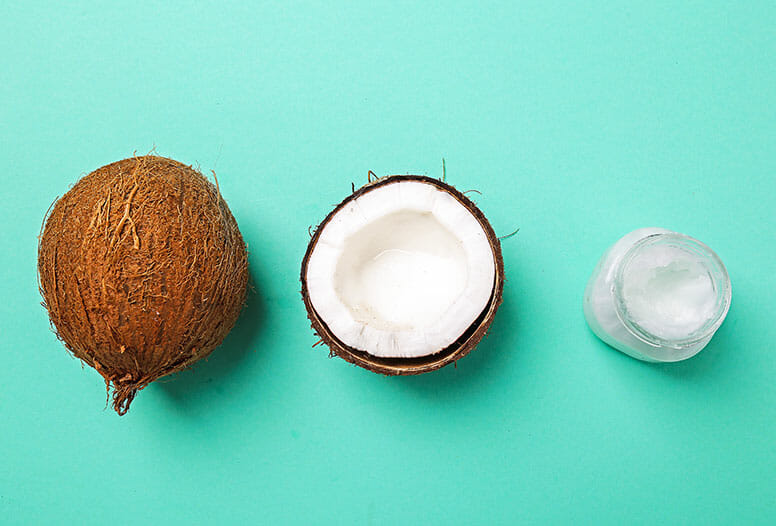The health benefits of coconut oil have become a hotly debated subject. The American Heart Association came out with a warning against its use, but many nutrition professionals were in disbelief considering the research available that indicate several health benefits. So is coconut oil a healthy oil that can have protective effects against degenerative brain diseases, complications of diabetes, and cardiovascular illness, or does it pose a risk to health due to its saturated fat content? And what role can coconut oil have in weight loss and reducing fat mass in adults? Let’ look at what the actual research has to say:
Compared to other saturated fat sources, coconut oil contains higher concentrations of medium-chain triglycerides (MCTs). Research has shown that MCTs can help promote weight loss by speeding up metabolism. In a meta-analysis published in the Journal of the Academy of Nutrition and Dietetics in 2015, MCTs were shown to significantly decrease body weight, waist circumference, and body fat when compared to other types of fats. These results have implications for foods containing high concentrations of MCTs, like coconut oil, may help promote weight loss.
Another study published in Nutricion Hospitalaria in 2015 examined the role of coconut oil in improving cholesterol levels and other body measurements (including body mass, waist circumference, and BMI) in adults with coronary heart disease. Adults who received daily supplementation of 13ml of extra virgin coconut oil (approximately 2.5 teaspoons of oil) for 90 days were found to have decreased waist circumferences and increased HDL (good) cholesterol compared to a control group. This study suggests that coconut oil may actually be beneficial for heart health, not harmful, even though it is high in saturated fat.
In 2009, the journal Lipids published a study about the effects of coconut oil compared to soybean oil on women aged 20-40 years with abdominal obesity. Women were asked to take daily supplements containing 30ml (approximately 2 tablespoons) of coconut oil over 12 weeks, in addition to following a low-calorie diet and walking for 50 minutes per day. While both the soybean oil and coconut oil groups had lower BMIs at the end of the trial, only women who had the coconut oil supplements had a reduction in waist circumference. Coconut oil may help reduce abdominal fat, which is generally seen as more harmful to health.
Some critics skeptical of use of coconut oil for weight loss state that much of the existing research is on isolated MCTs instead of pure coconut oil and cannot be generalized. As coconut oil becomes more common in daily use, it is likely that more studies will be conducted to clarify the risks and benefits of coconut oil in the diet. Concerning weight loss, coconut oil appears to be effective for reducing waist circumference and central obesity, known risk factors of chronic illness.
You can add coconut oil to your diet in a few ways, consider using a tablespoon or two daily while cooking your food, just watch your portion as it is high in calories. Or an even more effective way is to use a supplement like our Extra Virgin Organic Coconut Oil softgels. These are already portion controlled so you don’t have to be concerned about the calories. The addition of a bit of coconut oil to your diet seems to be beneficial to help you on your weight loss journey.
